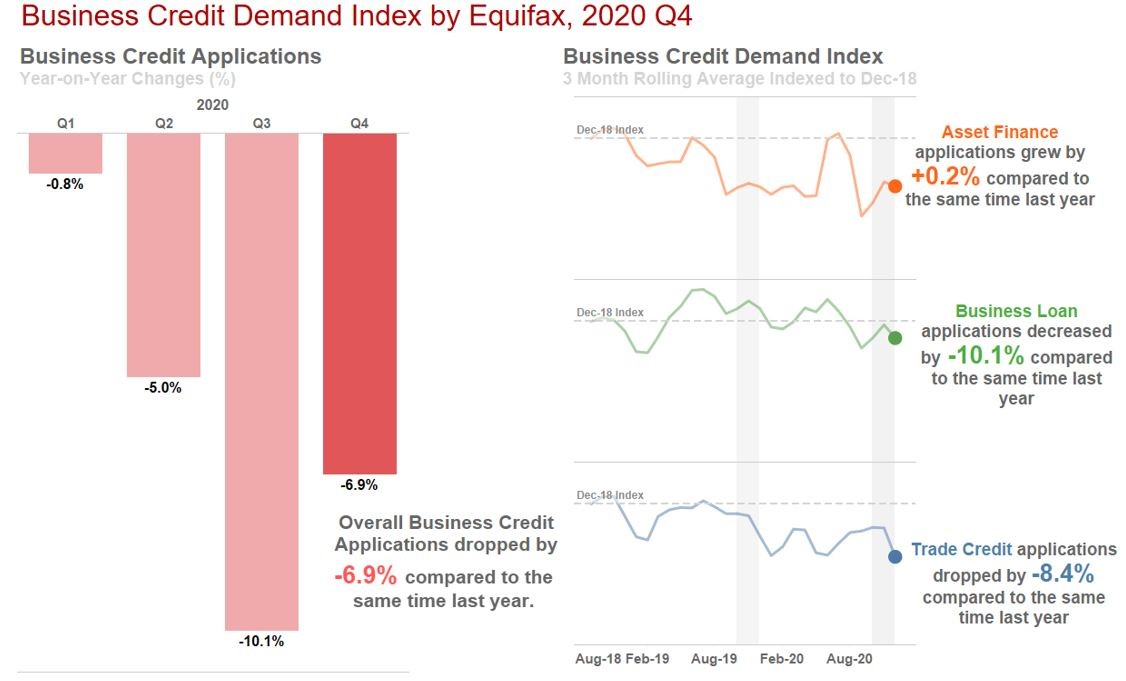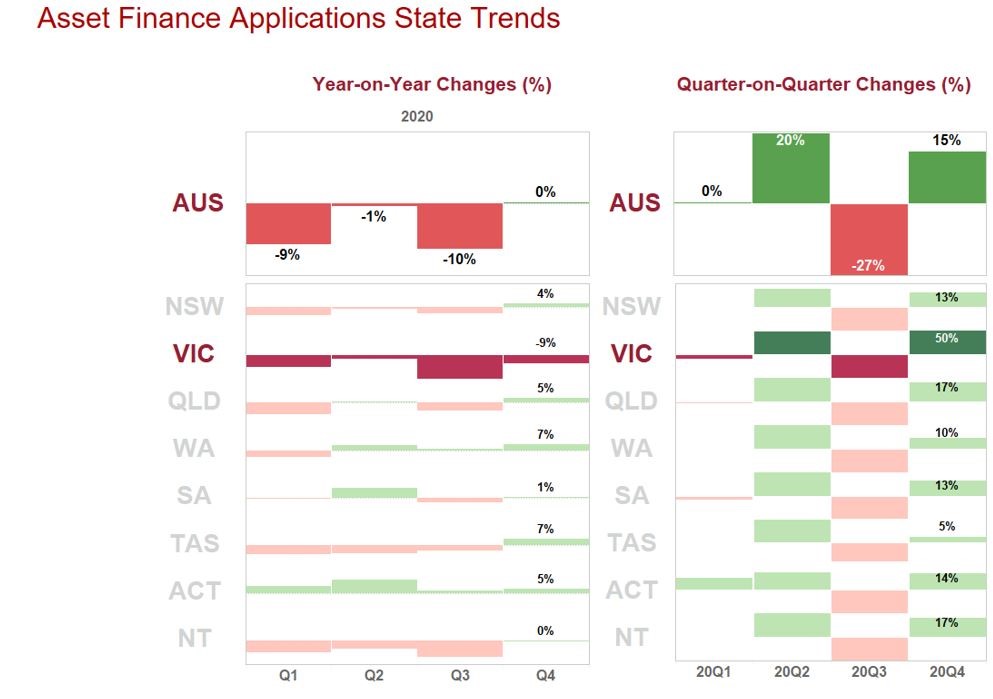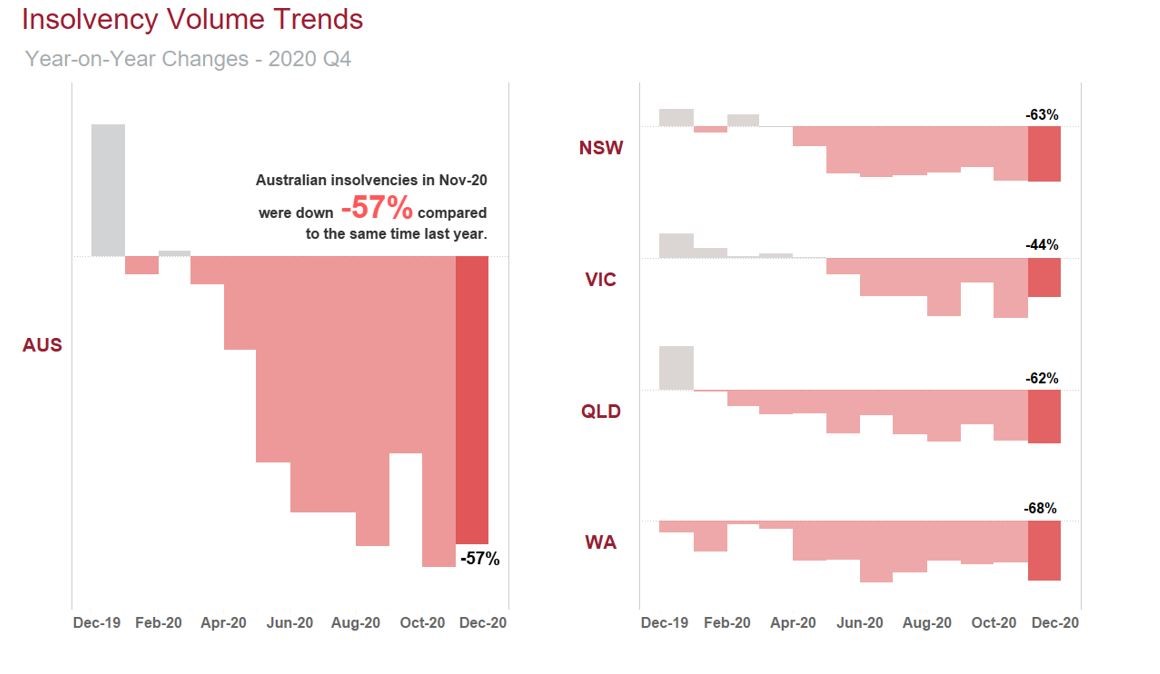Business credit demand rate of decline eases with bounce back in Victoria
Equifax Quarterly Business Credit Demand Index: Dec 2020
- Overall business credit applications down -6.9% (vs Dec quarter 2019)
- Business loan applications decreased by -10.1% (vs Dec quarter 2019)
- Trade credit applications fell -8.4% (vs Dec quarter 2019)
- Asset finance applications increased by +0.2% (vs Dec quarter 2019).

SYDNEY – 18 February 2021 – Business credit demand continues to decline year on year, but the rate of decline eased in the December 2020 quarter. Asset finance applications have increased by +0.2% compared to the December quarter 2019 and there are signs of a bounce back in Victoria, according to the latest Equifax Quarterly Business Credit Demand Index (Dec 2020).
Released today by Equifax, the global data, analytics and technology company and the leading provider of credit information and analysis in Australia and New Zealand, the index measures the volume of credit applications for trade credit, business loans and asset finance.
Victoria’s reopening in the December 2020 quarter after more than four months of COVID-19 lockdown has boosted business credit applications in this state by +12% compared to the previous quarter. NSW, Queensland, Western Australia, South Australia and the ACT also experienced an uptick in applications.
While business loan applications remained low in all major commercial centres, the rate of decline softened. Applications in Victoria were up by +7% in December 2020 compared to the September quarter, closely followed by Queensland and Western Australia (+5%).
Asset finance applications strengthened in all states and territories. Commercial demand from the construction industry fuelled much of this growth in the December 2020 quarter, with applications up +9% compared to the previous year and +27% compared to the September quarter.
While asset finance applications in Victoria were -9% lower compared to the same time last year, there was significant rebound in the December 2020 quarter, compared to the September 2020 quarter, with applications rising by 50%, well ahead of the other states.
Scott Mason, General Manager Commercial and Property Services, Equifax said: “While overall business credit demand remains down, it is encouraging to see that there are signs of a turnaround. The lifting of extended restrictions in Victoria has allowed for a rebound in business credit applications driven by asset finance.”
“In the coming months, we will be looking to company insolvency volumes as a forewarning of what lies ahead for the business sector. While insolvencies in November 2020 were 57% lower than the previous year, there is the potential for a rise in bankruptcies as government stimulus and bank deferral packages come to an end,” said Mason.
Business credit demand Dec 2020 vs. Dec 2019:
Business credit applications dropped (-6.9%). Applications were down in VIC (-14%), NSW (-4%) and SA (-3%). The NT experienced positive growth (+3%), followed closely by QLD and WA (+2%) and TAS (+1%). The ACT experienced no change.
Business loan applications remained down (-10.1%). Applications were depressed in most states, including VIC (-16%), NSW (-8%), TAS (-6%), SA (-3%), the ACT (-1%). The NT (+7%), WA (+3%) and QLD (+2%) experienced an increase in applications.
Trade credit applications continued their negative trend (-8.4%). The decline was particularly evident in VIC (-13%), followed by SA (-9%), WA (-5%), NSW (-4%), QLD (-2%), NT (-2%) and the ACT (-1%). Tasmania (+11%) was the only state to experience an upward trend.
Asset finance applications show positive growth (+0.2%). Applications were up in WA (+7%), TAS (+7%), QLD (+5%), the ACT (+5%), NSW (+4%) and SA (+1%). NT experienced no change while applications fell in VIC (-9%).
IMAGE 1: Equifax Commercial Credit Demand Index – December 2020 Quarter

IMAGE 2: Asset Finance Applications State Trends

IMAGE 3: Insolvency Volume Trends – DEC 2020 quarter, Year on Year changes

* The data has been re-indexed from December 2018:
- Re-indexed data to commence in December 2018 (previously June 2014)
- A three-month rolling average is now used, previous reports have used a 12-month rolling average
- A quarter on quarter comparison has been included, in addition to year on year
###
ABOUT EQUIFAX
At Equifax (NYSE: EFX), we believe knowledge drives progress. As a global data, analytics, and technology company, we play an essential role in the global economy by helping financial institutions, companies, employees, and government agencies make critical decisions with greater confidence. Our unique blend of differentiated data, analytics, and cloud technology drives insights to power decisions to move people forward. Headquartered in Atlanta and supported by more than 11,000 employees worldwide, Equifax operates or has investments in 25 countries in North America, Central and South America, Europe, and the Asia Pacific region. For more information, visit www.equifax.com.au or follow the company’s news on LinkedIn.
FOR MORE INFORMATION
NOTE TO EDITORS
The Quarterly Business Credit Demand Index by Equifax measures the volume of credit applications that go through the Commercial Bureau by financial services credit providers in Australia. Based on this, it is a good measure of intentions to acquire credit by businesses. This differs from other market measures published by the RBA/ABS, which measure new and cumulative dollar amounts that are actually approved by financial institutions.
DISCLAIMER
Purpose of Equifax media releases:
The information in this release does not constitute legal, accounting or other professional financial advice. The information may change, and Equifax does not guarantee its currency or accuracy. To the extent permitted by law, Equifax specifically excludes all liability or responsibility for any loss or damage arising out of reliance on information in this release and the data in this report, including any consequential or indirect loss, loss of profit, loss of revenue or loss of business opportunity.
Related Posts

Mortgage demand hits four-year high as a second consecutive quarter of double-digit growth for credit cards is observed and most prominent among younger Gen Z’s.

The latest Equifax Business Market Pulse for Q4 2025 reveals a multi-speed recovery. Large businesses are leading the way on credit demand growth, with an observed increase in overall demand reaching heights of up to +19.4% (trade credit) in some sectors, such as hospitality.
